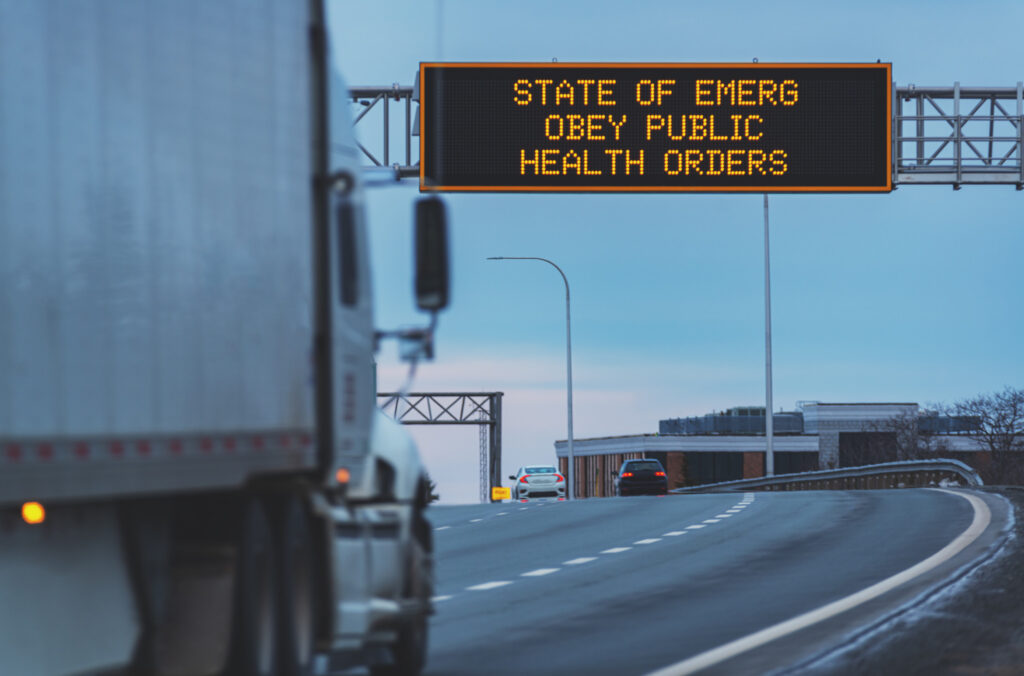Trucks still idle in wake of Covid-19 shutdowns, insurance data shows
TORONTO, Ont. – Ontario and Quebec fleets that parked trucks against the fence during the early days of Covid-19 are gradually returning to service, but insurance data shows that not all the wheels are rolling.
“You’ve seen more trucks getting back on the road,” Intact Insurance vice-president – specialty solutions Angelique Magi said in a presentation for the Toronto Trucking Association.
But some of the originally idled equipment continues to carry “parked endorsements”.

“We are pretty much at around, I’m going to say, 85% of what would have been taken off (the road),” she told Today’s Trucking, referring to idled equipment that has returned to service in Ontario and Quebec.
“Alberta was already in trouble before this anyway.”
The gradual return to service, combined with active load boards, illustrates that fleets are taking a thoughtful, staged approach in their return to business – and ensuring that trucks are securing the operating margins needed to move freight, she said.
“There is freight there, and the freight rates are going up,” Magi told the webinar. “It’s a matter of driving capacity.”
But economic conditions aren’t the only factors to idle equipment during Covid-19. The shortage of truck drivers is an example of that.
The pandemic compounded the issue because some drivers were not comfortable crossing the border during shutdowns, she said. “That shrunk that ability of being able to move freight even more.”
The insurance executive also observed that cargo thefts are now on the rise, and predicted more thefts to come over the winter, with thieves targeting high-end goods, groceries, dry goods and dry freight alike.
In the months to come, Magi also expects a broader “shift” in the trucking industry, as fleets explore mergers, purchasing operations, and other potential lanes.
In the longer term, there will also be discussions about onshoring manufacturing activity, which could shift trade patterns, she said, referring to the need to monitor activity such as food production to see the opportunities that emerge.
But securing insurance coverage for such activity will face a challenge of its own in the midst of today’s hard market, especially as insurance companies try to come to terms with the “nuclear verdicts” pushing claims costs skyward.
“You can see that the math is not working,” she said, referring to the multi-million-dollar verdicts, especially those in the U.S. The exposure to litigation in the commercial businesses also continues to grow.
“It makes it very difficult as an insurer to make sure we’re on top of that particular trend, and how do we manage that?”
It’s among the factors that will likely see a greater focus on fleet safety initiatives.
“You are going to be hearing your brokers and insurers talking about what steps you are taking as carriers to make sure you’re mitigating your risk,” Magi said.
Also expect more attention on specific operating areas, the time trucks remain in particular areas of the U.S., and the related exposure it all brings.
There continues to be a consolidation in the insurance industry itself, leaving fewer players participating in some business segments, she added.
“This happens a lot in trucking,” Magi said. “There are insurers that are going to be long-term players, and there are insurers that are not.”
Have your say
This is a moderated forum. Comments will no longer be published unless they are accompanied by a first and last name and a verifiable email address. (Today's Trucking will not publish or share the email address.) Profane language and content deemed to be libelous, racist, or threatening in nature will not be published under any circumstances.
The idea of delayed insurance claims ends up costing a lot more money. Maybe insurance companies should work with the government to limit claim sizes and the n return cover the medical costs . Some towing bills are too high. I seen a bill to remove a trailer that hit a low bridge in New York City of over $30,000 U S to to tow 12 miles unloading and transfer 6 skids to another one on the carrier trailers. In Ontario Canada small trucking, wheel chair buses and vans are unable to afford the insurance rates. I have been homeless for 6 years after my house was condemned after a wind storm over 7 years ago. The insurance companies have delayed claims costing me my health. The delayed means the two got no property taxes for the last 6 years and at least $60,000 taxpayers money and $15,000 for Non profit groups. To bring in more new truck drivers the whole system needs major changes. I am currently staying in a homeless hotel paid for by local government and private nonprofit organizations at a cost of over $2,000 per month. Their are several other people who have problems with their own insurance companies.